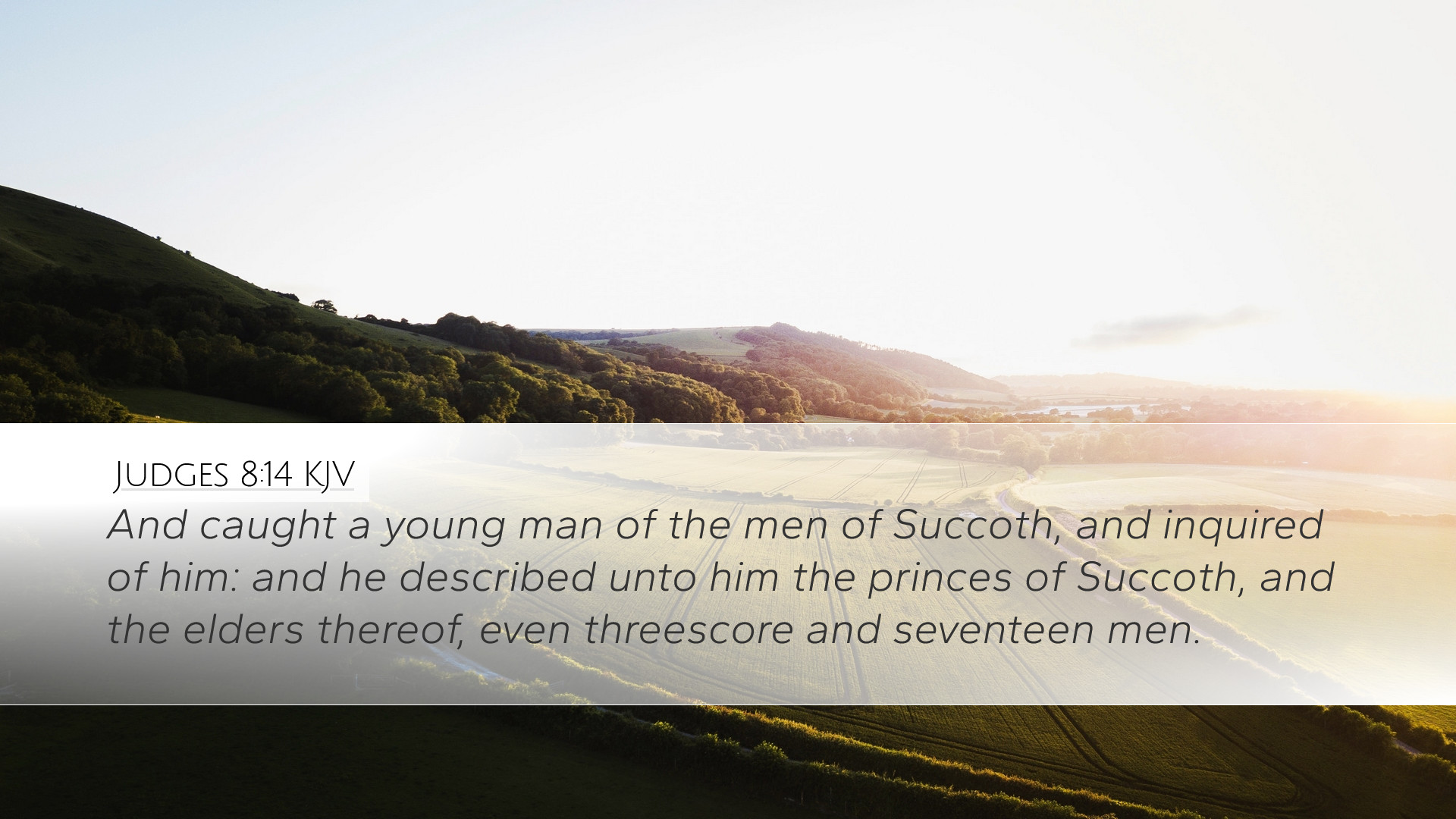Commentary on Judges 8:14
Verse Text: "And he caught a young man of the men of Succoth, and inquired of him: and he described unto him the princes of Succoth, and the elders thereof, even threescore and seventeen men."
Introduction
Judges 8:14 captures a critical moment in the narrative concerning Gideon, Israel’s judge. Following his successful conquest against the Midianites, Gideon seeks vengeance against the men of Succoth for their refusal to aid him during his campaign. This verse provides insight into both the character of Gideon and the nature of the Israelite tribes during this tumultuous period of their history.
Contextual Analysis
Understanding the context of this scripture is pivotal. The Book of Judges depicts a cycle of sin, oppression, repentance, and deliverance experienced by the Israelites. Gideon, chosen by God, defeats the Midianite army with an army of just 300 men, demonstrating that divine strength can operate through human weakness.
Gideon's Leadership
Matthew Henry notes that Gideon's quest for vengeance was not simply an act of pride but was exhibited within the framework of Israelite justice and accountability. The elders of Succoth had failed to assist him, which was tantamount to siding with the oppressors and dishonoring God.
Significance of Succoth
Succoth, a city on the eastern bank of the Jordan River, is a notable location within Israel’s history. Adam Clarke points out that its inhabitants' refusal to provide bread to Gideon during his time of need reflects a failure to recognize God’s governance and promises. Their hesitation indicates a lack of faith in God's deliverance through Gideon.
Character Study: Gideon
Gideon's actions reveal several key characteristics of his leadership:
- Determined: Gideon does not shy away from challenging the unfaithfulness of Succoth. Rather, he actively seeks out the leaders to confront them.
- Just: His inquiry about the princes signifies a desire for accountability, revealing a commitment to establishing justice in Israel.
- Courageous: The act of apprehending a young man to gather information illustrates Gideon's willingness to approach difficult situations directly.
Insights from the Commentaries
Albert Barnes on Accountability
Albert Barnes emphasizes that Gideon's inquiry serves as a reminder of communal accountability within Israel. The refusal of Succoth to assist in battle resulted in consequences. Such accountability was essential for maintaining unity and strength against shared enemies.
Symbolism of the Young Man
The choice to capture a young man conveys significant symbolism. According to Henry, the young man, representing the present generation, stands in contrast to the older princes who demonstrate a lack of fidelity. This demonstrates a disconnection between the leadership and the common people in understanding God's purposes.
Theological Reflections
This verse raises several theological reflections that are important for modern readers:
- Faithfulness Under Pressure: The men of Succoth represent those who, under pressure, might choose the path of least resistance instead of standing firm in faith.
- The Nature of Leadership: Effective leadership involves seeking to maintain accountability and responsiveness from those you lead.
- Divine Justice: Gideon’s pursuit for the heads of those who opposed him reflects a broader theme of divine justice within the biblical narrative.
Pastoral Application
For pastors and spiritual leaders, Judges 8:14 serves as a powerful reminder to encourage loyalty and faithfulness among congregations. Like Gideon, leaders must seek to hold members accountable, fostering an environment where trust in God’s provision is paramount.
Conclusion
Judges 8:14 is not merely a historical account but a profound lesson in accountability, faithfulness, and the essential characteristics of leadership in the community of God. The insights drawn from public domain commentaries provide a multifaceted view of Gideon's actions, urging both modern believers and leaders to reflect on their commitment to God's calling and the implications of their decisions on the community and their faith walk.


